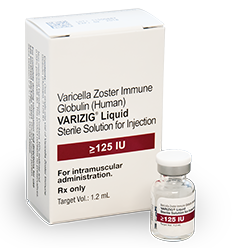Indication
VARIZIG is a Varicella Zoster Immune Globulin (Human) indicated for post-exposure prophylaxis in high risk individuals. High risk groups include:
- immunocompromised children and adults,
- newborns of mothers with varicella shortly before or after delivery,
- premature infants,
- infants less than one year of age,
- adults without evidence of immunity,
- pregnant women.
VARIZIG administration is intended to reduce the severity of varicella. Administer VARIZIG as soon as possible following varicella zoster virus (VZV) exposure, ideally within 96 hours for greatest effectiveness.
- There is no convincing evidence that VARIZIG reduces the incidence of chickenpox infection after exposure to VZV.
- There is no convincing evidence that established infections with VZV can be modified by VARIZIG administration.
-
There is no indication for the prophylactic use of VARIZIG in immunodeficient children or adults when there is a past history of varicella, unless the patient is undergoing bone marrow transplantation.
Product Description
VARIZIG is supplied as a sterile solution for intramuscular injection and is available in a single-use vial of 125 IU.
| NDC Code | Strength | Concentration | ||
|---|---|---|---|---|
|
≥125 IU | ≥104 IU per mL |
Dosage and Administration
FOR INTRAMUSCULAR ADMINISTRATION ONLY.
Dosing of VARIZIG is based on body weight. Administer a single dose of VARIZIG intramuscularly as recommended in the following table.
| Weight of Patient | VARIZIG Dose | Volume to Administer* (milliliters) | ||
|---|---|---|---|---|
| Kilograms | Pounds | IU | Number of Vials | |
| ≤2.0 | ≤4.4 | 62.5 | 0.5 | 0.6 |
| 2.1–10.0 | 4.5–22.0 | 125 | 1 | 1.2 |
| 10.1–20.0 | 22.1–44.0 | 250 | 2 | 2.4 |
| 20.1–30.0 | 44.1–66.0 | 375 | 3 | 3.6 |
| 30.1–40.0 | 66.1–88.0 | 500 | 4 | 4.8 |
| ≥40.1 | ≥88.1 | 625 | 5 | 6.0 |
* Extractable volumes are confirmed using a 21 gauge needle as per USP General Chapters <1> Injections
Consider a second full dose of VARIZIG for high risk patients who have additional exposures to varicella greater than three weeks after initial VARIZIG administration.
The minimum dose is 62.5 International Units (IU) for small infants under two kilograms body weight; the maximum dose of 625 IU should be administered for all patients greater than 40 kilograms in weight.
Administration
For intramuscular use only. Divide the intramuscular dose and administer in two or more injection sites, depending on patient size. Do not exceed 3 milliliters per injection site.
Inject into the deltoid muscle or the anterolateral aspects of the upper thigh. Due to the risk of sciatic nerve injury, do not use the gluteal region as a routine injection site. If the gluteal region is used, only use the upper, outer quadrant.
To prevent the transmission of infectious agents from one person to another, use a new disposable sterile syringe and needle for each individual patient.
Please see full Prescribing Information for full Dosage and Administration details.
Storage and Handling
Store VARIZIG at 2 to 8°C (36 to 46°F). Do not freeze. Do not use after expiration date.
- Available as a single-use vial of ≥ 125 IU
- Intramuscular injection only
For VARIZIG product inquiries, call (855) 898-2446.
Individuals known to have severe, potentially life-threatening reactions to human globulin should not receive VARIZIG or any other immune globulin (Human). Individuals who are deficient in IgA may have the potential for developing IgA antibodies and have severe, potentially life-threatening allergic reactions. In patients who have severe thrombocytopenia or any coagulation disorder that would contraindicate intramuscular injections, only administer VARIZIG if the expected benefits outweigh the potential risks. Thrombotic events may occur following treatment with VARIZIG and other immune globulin products. Products made from human plasma may carry a risk of transmitting infectious agents, e.g. viruses and, theoretically, the Creutzfeldt-Jakob disease agent. The most serious adverse drug reactions observed in clinical trials for all subjects and patients include pyrexia, nausea, chills and vomiting. The most common adverse drug reactions observed in clinical trials for all subjects and patients were injection site pain, headache, chills, fatigue, rash and nausea. Please see Prescribing Information for full prescribing details.
To report SUSPECTED ADVERSE REACTIONS, contact Kamada Therapeutics at +972-8-9406472 or FDA at 1-800-FDA-1088 or www.fda.gov/medwatch.
 |

